Photo: George Mays
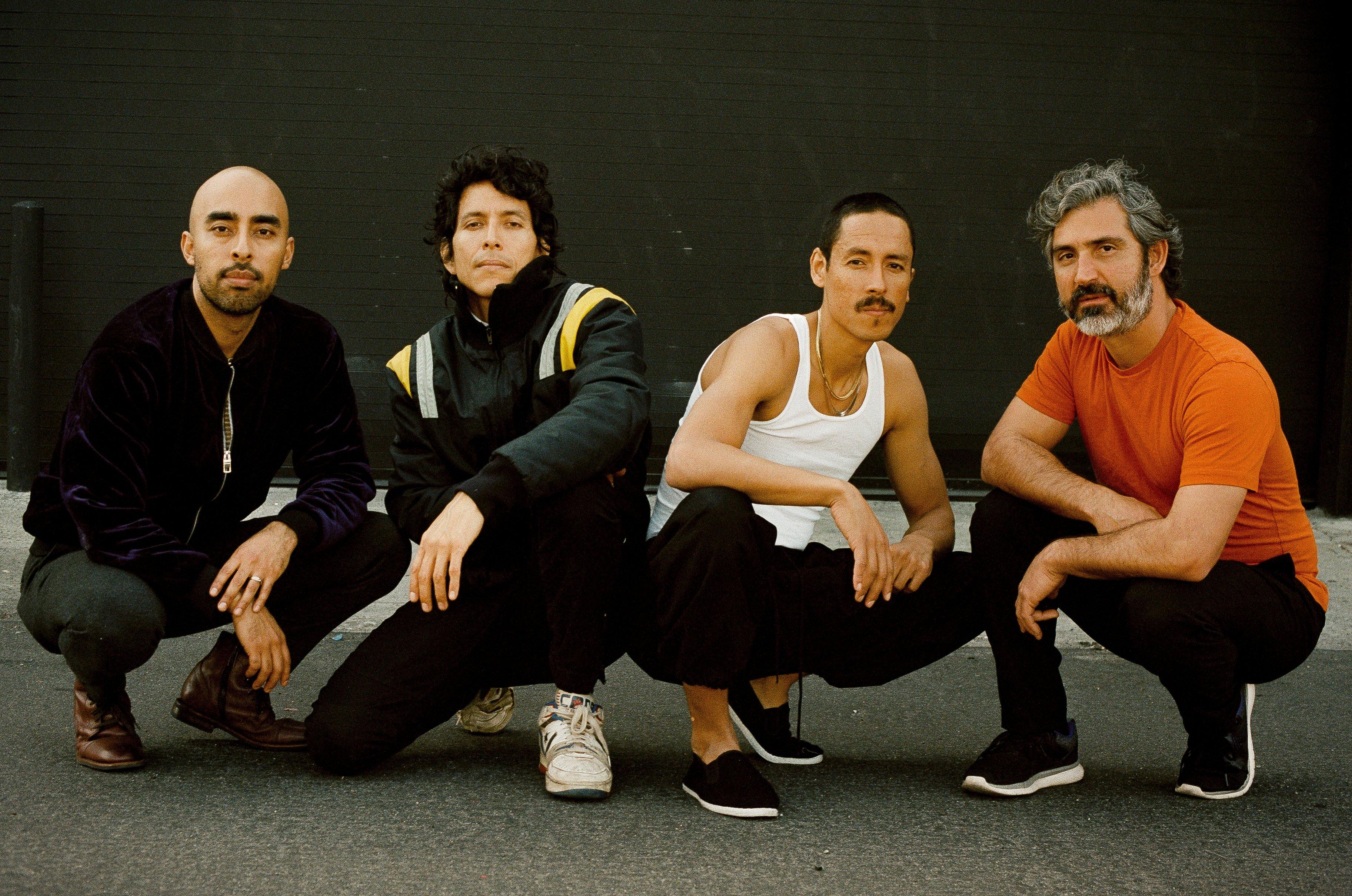
Chicano Batman
news
Chicano Batman Talk Creating Visibility For 'Invisible People,' Representation Of Latinos In Media & Repping Los Angeles
The beloved L.A. psych/soul rock band dive deep into their powerful, danceable fourth studio album, 'Invisible People,' identity, racism and what the West Coast city means to them
There is real power in music that gets you dancing, feeling joy and thinking about critical human issues. That is exactly what Chicano Batman's music does—drawing you in with their groovy bass lines, warm and soulful vocals and all-around funky, sun-soaked instrumentation and aesthetic. With their fourth studio album, Invisible People, released May 1 on ATO Reords, they double-down on the funkiness and deliver their most powerful, rhythmic project yet.
Founded in 2008 in Los Angeles, the four-piece embodies the true beauty, creativity and diversity of the city they call home. Since the release of their self-titled debut album in 2010, the band has brought their infectious energy and vibrancy to countless shows and festivals through Southern California, the U.S. and abroad, with a (typically) active tour schedule.
With their 2020 tour with Le Butcherettes put on hold until 2021, the group has stayed busy with virtual appearances on "The Late Show With Stephen Colbert," NPR's Tiny Desk, KEXP and more. They've also stayed engaged with their community despite quarantine, offering youth music workshop livestreams with the Young Musicians Foundation and a delicious fundraising taco at L.A.'s HomeState.
In conversation with GRAMMY.com, Bardo Martinez (lead vocals, keyboard and guitar), Carlos Arévalo (guitar), Gabriel Villa (drums) and Eduardo Arenas (bass) dive deep into the creative process and meaning behind their latest album. They get real about identity, racism and representation, and the marinization they have experienced as Latinos in the indie-rock space.
You guys dropped the fourth Chicano Batman album, Invisible People, just back in May. What was the creative process like on this album? How long were you guys working on it?
Villa: A few years?
Arévalo: [Laughs.] A few years. Yes. That's it.
Villa: A few years. Next question. [Everyone laughs.]
Arévalo: Maybe 14 months.
Villa: We had to go on tour, so, we had to stop a little bit. We had writing sessions, but we basically started in 2018.
Arenas: In 2018, we talked about different ideas we wanted to introduce to the new record, and we did a lot of demos. At the end we chose 12 songs. Everybody kicked in on this one and helped develop it, where in the past the Bardo wrote the majority of the songs. This time Carlos was kicking in stuff, Bardo was kicking in stuff. I would join up forces with them and throw in stuff. There were all these different combinations of things that happened that we had not explored in the past.
Martinez: Recording was a big part of it, us using our home studios to record stuff and vibe that way.
Villa: Carlos, talk a little bit about that moment where you came into rehearsal and you were like, "Guys, I know we have to do this album, but wait listen!" [Everyone laughs.]
Arévalo: I had my own little idea of what I thought the record should be in terms of a theme or a direction. That's something I would keep to myself on the past records and then just have my own personal goals for my instrumentation. But this time I shared it aloud to the group. That's choppy waters you can get into because you're asking a drummer to play drums a certain way or a singer to sing a certain way. Well, it's more recommending or showing examples of like, "Hey, could we try it this way this time and see how that goes?" That was a vulnerable place to be. But I've known these guys for so many years, it was time for me to be real with them and hope for the best.
They were receptive, everybody needed a little bit of time at first to just take it in. Once we started trying out these ideas, everybody else started bringing in other stuff they'd been wanting to try before, but maybe never thought this was the project to do that. So, I got the juices flowing creatively for everyone. It was cool.
Martinez: Yeah, this record was a lot of push and pull, as it's always been with our music. It's four dudes in a band, so everybody's pushing for whatever ideas they had in their head. I mean, Carlos was pretty straight forward. He was like, "Well, we should make something we could dance to, danceable music." It was a great idea. It brought us into the late '70s and '80s in terms of aesthetics, in terms of sound—it was new territory for me. It was a lot of fun. It's a dope realm that we eventually got to.
Villa: It was definitely fun to create. The whole process was just fun, fun, fun, and a lot of communication. We learned a lot. We're always inspired and happy to be working with the team so it really, really paid off. You can hear it in the music. If you compare the Chicano Batman discography, you really hear that this album is so different from the rest. It definitely has that element of dancing—for the first time we're doing a lot of 16-notes. [Mimics fast drum beat.]
Listen Up: Record Store Recs: Chulita Vinyl Club On The Best Music Stores In L.A., Oakland, Austin & Beyond
Carlos, that idea you came in with, was it "dancing" music or something else?
Arévalo: I had started a little DJ night as an excuse to play records that I was collecting on the road with being on tour—you hit up shops in Michigan and you find amazing 45s that are just so overpriced in L.A. or that you can't even find them. I was playing once a month at bars and exploring what music has that universal appeal to people, that makes them want to get up and move or sing along. It's a cool way to experience music when you have the sound system at your behest. I was controlling the PA and it's bumping, I could control the bass. I could see what was going on from the mixer. That inspired me.
There's so many 45s that I love. I would play stuff like Talking Heads' "Naive Melody," Tom Tom Club. I'd play Prince's "Erotic City," that '80s music that had amazing songwriting appeal, but simultaneously were hit records. I feel that doesn't go hand-in-hand all the time anymore. Now, you have writers that get together to make a song sound exactly like this other song so it can be a hit and make money. It's about capitalism and it's about getting that publishing. Back then, it was more so you can make an art piece that was also danceable. It was really appealing and inspirational to me.
The Purple One: From Foo Fighters To H.E.R., Chris Martin To Mavis Staples, Here's Who Rocked The GRAMMY Prince Tribute
When did you finish the album? Since you were working on it on and off, was there a period of time where you huddled up and finished all of it?
Arévalo: Yeah, so we started writing the record, like they said, in January 2018. And then we demoed it when we could and we started amassing demos amongst all of us. We had little sessions in between touring and we finally started recording the album in February 2019 at Barefoot Recording, which used to be called Crystal Industries. It's where Stevie Wonder recorded one of his epic '70s trilogy albums, Songs in the Key of Life, those amazing records where he found his synthesizer voice. So many hit records were made there. Sly Stone worked out of there and George Clinton. So, we made Invisible People there for two weeks and then Bardo flew to New York for another two weeks to do vocals and some overdubs. Then we had to wait a year to put it out.
Martinez: Well, it got mixed and we put all the music together. Leon Michels produced it. He definitely put his hand in the sound of it. He's an amazing producer [he's also worked with Lee Fields, Aloe Blacc, The Carters and others] and has an amazing hip-hop sensibility. He knows how to make everything knock. He definitely added some amazing vibes, and then he passed it over to [five-time GRAMMY winner] Shawn Everett who mixed it. So, that was the whole next process of, "okay, well he got the music" and we were in the dark for a week or month or so.
Once we received it, I'm telling you, for me, the summer of 2019 was lit, 'cause it was just blazing, f****ing listening, bumping that in my car. I had just moved into this house that I live in now. It was amazing. Imagine, you move into a new house and you're playing a new record. I had my friends over and it was amazing. It was perfect.
Read: Aluna On New Album 'Renaissance' & Making Dance Music Inclusive Again
The title track, "Invisible People" is really powerful and very pertinent to this moment we're in right now—calling out racism. Can you speak to the message behind this song and how you feel that it informs the rest of the album?
Marinez: We came up with a thesis statement, which was the title itself. Carlos was like, "How about we write a song about how the marginalization of Latinos?" "Invisible People"—for example, not being noticed in the indie music world or being on tour and feeling marginalized just entering spaces like the liquor store in Tennessee. That was one piece of it.
I started tackling different pieces in different verses, and I only have three verses. I wanted to make sure that whatever I was saying was going to be very strong and very poignant, straight to the point. I didn't have time to cut corners, so I was going to be direct with it. I wanted it to be as strong as possible because the music was set up that like that. We went into the studio and that song was [originally] a little bit faster and Leon suggested we slow it down. The instrumentation is super sparse. The beat is heavy, the bass drops on the kick in the perfect place. The music is there for the vocal to just shoot out.
I approached every verse as a different thing. My first line is, "Invisible people, we're tired of living in the dark. Everyone is trying to tear us apart." So, it's obviously pointing at some type of marginalization. It's not necessarily specific. The second line—"smoke a spliff so I could feel now"— I don't even smoke spliffs by the way, I like joints, but it was a homage to maybe Bob Marley or something I knew a lot of people were going to relate to. Something edgy, something cool. The next verse is about race, "The truth is we're all the same. The concept of race was implanted in your brain." I definitely wanted to call that out, race as a construct pretty much.
Also, just to challenge all of that because as a band, as, we're Chicano Batman. We decided to use this name, which has its own meanings as a Chicano, as an identity. I don't know if that's problematic, but it's going to challenge norms within our own community, and also in the superstructure status quo. That's the more obvious knot.
Also, anybody could be invisible in society. It wasn't "Just Latinos are invisible or just people of color." The privilege that White people have in this country is not good for them. When they walk onto the street, into the supermarket, there's a lot of psychological weight to all that history, to alter that reality which is based upon history, decades and centuries of oppression, that White people really have to deal with as well. Everybody, regardless of who you are, if you're living in a city, if you're living in society, you're a part of it. You're complicit in it. You're subjugated by it. People don't necessarily talk about it like that on Instagram. People on Instagram are just pointing fingers at each other. So, that's really not the goal of it. The goal is to be like, "Yo, the truth is we're all in this together." It's not some "We Are The World" shit. It's also, "This record is fire, we're spinning the world around you. We got this record, we're ready to tour and do it big." It's all those things wrapped into one.
Arenas: Piggybacking off what Bardo said about Instagram, they're probably not saying that on Instagram because White cops are too busy killing Black people and shooting them in the back. That's a reality that White privilege has led to, it's not only capitalism, but genocide. That's also what we have to live with today. Not only with religion, but with the way communities are divided, with the way we think, with our mental health as a people, with our communities and the disinvestment in them and the lack of education and resources. This is all very implicit and designed to be this way, to lack people of color of the resources while the few good resources go to the top. That's the system that we've been living under here in the United States for a very, very, very long time.
I think for me, "Invisible People" has a very open open-ended meaning, it's a very big concept, and I think it can definitely be understood differently in 10 years, in 30 more years, et cetera. But right now, to me, it speaks so much about the murder of innocent people, invisible people, who are our family members, our voices, our activists. They're actors of change in our society, the heroes. So, to me, we need to put some extra highlight on that at this moment right now.
Arévalo: For me, the idea for the song was explicitly about people of color and the struggle we've endured. I don't know how many bands GRAMMY.com has interviewed where they get pulled over by border patrol in Florida for driving in a tour van, but that's our experience. I don't know how many indie rock bands have gone through that. Dealing with stuff like that was in my mind when bringing up the idea of the song, and the lack of representation we see of Latinos in the media, you don't see us with parts of substance in movies or TV shows. It's always cliched, and it makes me sick, because we're multi-dimensional. We are more than caricatures.
So, that was part of the idea. Also, just tongue-in-cheek like, "Do you see us now? Here we are, this is our record. Will you acknowledge us yet?" Because there has been a hump of, people keep saying, "Chicano Batman is breaking through with this record, this rising band." And every time we put out a record, we're always this new band that's coming out of nowhere. So, it's a critique on that and how the status quo in the media views us.
You've said "Color my life," which opens the album, is about experiencing nature versus being stuck in the city. Was there a specific experience, feeling or place that inspired this song?
Martinez: That's the first time somebody asked me where, what's the location. I appreciate the question. Honestly, it's Oakland. I lived in Oakland for a year and a half. That was the first thought, literally what I was thinking about when I was writing those verses. I had some lyrics that were taken out too. During the chorus, "You've got to color my life..." I had something about birds. Anyways, Oakland was definitely the place.
Do you feel now when you perform "Color my life" now, especially in a virtual setting like on the NPR's Tiny Desk, do you feel it has taken on new meaning?
Martinez: I'll be honest, it's hard for me to connect with the virtual stuff. It's difficult. I'm a little numbed by the whole virtual reality experience. But what's the new meaning? I just went to the forest recently, to Mammoth for four days with my family. I needed to do that. Honestly, it's been a long time since I've actually gone camping or anything that because of doing the music thing and touring. This pandemic has given me the opportunity to do some of that. I want to do it more often because it's the most freeing thing, just to be out in nature, it's fantastic.
<style>.embed-container { position: relative; padding-bottom: 56.25%; height: 0; overflow: hidden; max-width: 100%; } .embed-container iframe, .embed-container object, .embed-container embed { position: absolute; top: 0; left: 0; width: 100%; height: 100%; }</style><div class='embed-container'><iframe src='https://www.youtube.com/embed//hARU2pnprX4' frameborder='0' allowfullscreen></iframe></div>
"L.A. is what I carry with me all the time... It's what I try to represent in my music, at least respective to the instrument that I play and the swagger I input and the way I want people to move. We want them to feel that this is the way L.A. moves you, when we're in Germany, Brazil or France. It doesn't matter where, it's rooted in L.A. and L.A. is international because our roots are deep." -Eduardo Arenas
As a Los Angeles band, what does the city mean to all of you?
Arévalo: It's a forever home for me. My dad immigrated from El Salvador and lived in an apartment complex in Hollywood and went to Hollywood High, which I can't even imagine—what a dichotomy that must have been. My mom is third generation Mexican-American, so her family's been here since the '20s and they all have roots and stories that come from L.A. It's always been a big part of who I am and where I come from. I still have family that lives out there and also family that lives in L.A. It's an important part of my identity.
Villa: For me, L.A. feels like home. I come from very far away. I was born and raised in Colombia and I've traveled around the world. I had the opportunity and was so lucky to able to go to Europe and live there before coming to the United States. I lived over there for many years. Coming to L.A. straight from Toulouse, France was a big cultural shock for me, learning all these new set of laws and lifestyles. And there's a lot of things I probably will never understand, like the freeway, but L.A. is special, it has so much, it's a place for everyone. I feel it's a big blender and that's something that I like about this city. When I was in France and went to Paris and rode the Metro and saw all these different cultures together, I was like, "This is good. I want to live in a city this."
And I ended up living in L.A., and you have the same feeling just like riding on a Metro in Paris. It's like a dream and every day I'm learning something new. There's a lot going on here in terms of opportunities and work, especially music and media. It's crazy. I'm super glad and lucky to have found my brothers here. The band has embraced me as a Chicano, as a brother, and that's the world for me. Yes, I feel home.
Arenas: I'm born and raised in L.A., I'm from the generation of kids that used to walk to the market and get a gallon of milk and a pack of tortillas. That's how I grew up. I used to sell flowers in the street on Mother's Day and Valentine's Day. We used to sell fruit and vegetables that we'd get, extras from the produce market in downtown L.A. and resell them on the streets. L.A. is me.
I grew up with Hollywood movies and TV shows, all this '80s and '90s action stuff—the vanity that comes with that. And the vision of wanting to be something else that also comes with that. Like Carlos was saying, there's no representation of Latinos on TV, especially when you're growing up in the '80s and '90s, only dumbasses or a donkey mother****ers. Or some, "arriba, arriba" type shit, which we tossed around as culture when we were kids because we don't know better. But, in a lot of places in the country, they still perceive it like that.
L.A. is what I carry with me all the time, even when I lived in Brazil and Panama. It's what I try to represent in my music, at least respective to the instrument that I play and the swagger I input and the way I want people to move. We want them to feel that this is the way L.A. moves you, when we're in Germany, Brazil or France. It doesn't matter where, it's rooted in L.A. and L.A. is international because our roots are deep. Our roots go way back, they're not just bounded to the streets and these grids and these traffic lights, they go down really deep to communities in Mexico, at least for me. I think that's what I can offer.
Martinez: I grew up in La Mirada, Calif., it's a suburb [in L.A. County]. My dad came to Santa Ana, Calif. with his grandma in the late '60s. My mom came to Orange County in the early '80s from Cartagena, Colombia. They established the family. I was the first one to come out and there's only two of us. We moved to La Mirada and lived in some apartments over there for a while, and then they bought a house. Parks and beaches were part of my family's recreational activities. I look at L.A. as a massive region as a county, not just a city.
And to be honest, I'm infatuated by its natural beauty, these hills, the mountains, the wildlife, the ocean. I think of things like, "Wow, I can see the sunset over the oceans horizon because I'm facing directly west" in Redondo Beach. And conversely, the sun sets over the mountains when I'm in Long Beach because I'm facing south. After so many years I can visualize the panorama from various points in relation to the map. Although I navigate L.A.s streets and highways, I'd rather be on a bike, traveling at the speed of my own will, heading in whatever direction without so much regard to traffic or signals. I guess I try to feel the region I live in, as opposed to think of it in the confines of the names and boundaries, that actually don't exist.
What key things do you think are necessary for L.A. to become a place where all of its residents are celebrated and able to thrive?
Martinez: I think it's necessary for people to open their minds, drop the judgement. I feel like traveling definitely helped me see and feel things differently.
"For me, I'd say that following your heart can work!... I'm still marching to the beat of my own drum, because that's what I know how to do, and that's what makes whatever I do unique." -Bardo Martinez
It's been a decade since the band's debut—what have you learned about yourself as artists and as humans since then?
Martinez: For me, I'd say that following your heart can work! I've pursued music for aesthetic reasons, never really thinking about the markers of success, not to say those aren't necessary.
And I'm still marching to the beat of my own drum, because that's what I know how to do, and that's what makes whatever I do unique.
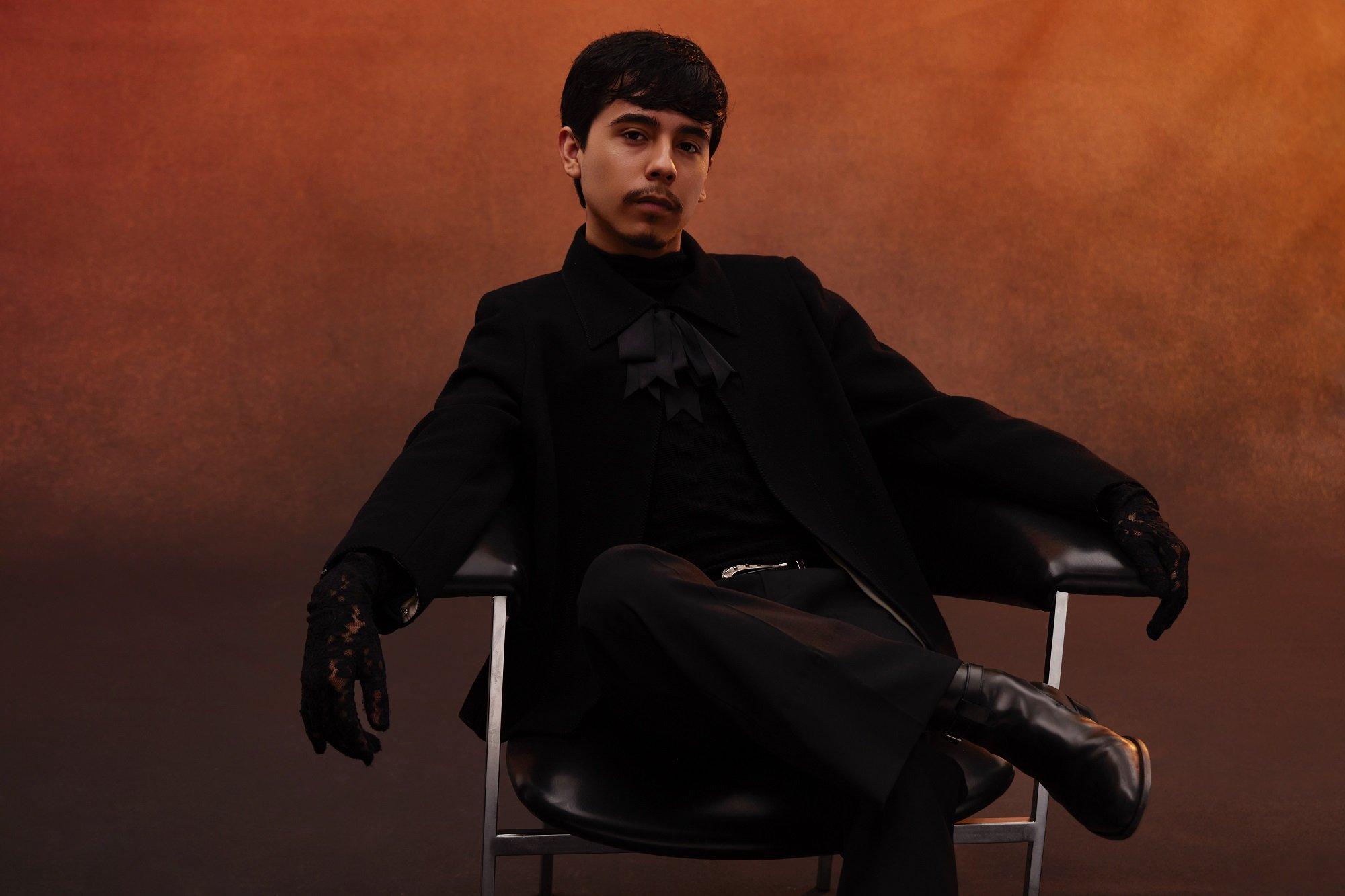
Photo: Le3ay Studio
interview
On 'Mirada,' Ivan Cornejo Redefines The Sound Of Sad Sierreño And Helps Fans Heal Through Music
Ivan Cornejo has always found solace in music. With his new LP, 'Mirada,' he wants his fans to experience that sense of belonging: "I write about emotions that everyone goes through or has been through."
Within the landscape of Música Mexicana, Ivan Cornejo is a rarity.
The 20-year-old California native stands out as one of the most intriguing acts in a genre represented by artists known for their flashy looks and music. Soft-spoken and warm, Cornejo's gentle demeanor effortlessly translates into his music and on-stage persona and musical productions.
Cornejo's songs and lyrics are far removed from the "corridos tumbados" that have taken over global charts. Fans have dubbed the Mexican American singer the "Gen Z therapist" because of his heartbreak-influenced lyrics and dexterity in creating the ethereal, melancholic sound known as sad sierreño.
With two albums under his belt, Cornejo makes his major label debut with Mirada, released on July 18 via Zaragoza Records / Interscope. The album features the wistful, sad sierreño sound that made Cornejo famous three years ago with "Está Dañada," a heart-wrenching ballad from his first LP, Alma Vacía (2021).
In the single, which has amassed over 270 million streams on Spotify, Ivan — then 17 — captivated listeners with powerful melodies accompanied by languid and nostalgic vocals, reciting verses filled with maturity beyond his years.
In Mirada, the Música Mexicana breakout star presents 12 solo songs inspired by summer nights, including singles "Aquí te Espero," "Donde Estás," "Baby Please," and "Intercambio Injusto." As with his previous productions, Cornejo makes heartbreak the central theme of his album while guitars and melodies reminiscent of alternative rock take center stage.
While the album doesn’t feature additional artists, Cornejo opened up to collaboration within the studio. The singer, used to collaborating solely with his producer, Frank Rio, encountered a challenge when bringing two additional creatives into the studio.
"The process for this new project was very different," Cornejo tells GRAMMY.com in a Zoom interview from Mexico City. "[Having other] creatives in the studio [resulted] a lot of learning. For example, my producer and I learned a lot from each other; we had constructive disagreements. We heard each other's opinions and learned a lot from this project."
The rising sad sierreño star discusses with GRAMMY.com the creative challenge of Mirada, the artistic boundaries he pushed along the way, the advantage behind bilingual songwriting, and the unexpected singer that influenced his lyrics.
This interview has been edited for length and clarity.
'Mirada' feels very personal, almost like a diary. How would you describe the album's overall theme and feeling?
While writing and recording this album, I wanted it to feel very personal, intimate, and gentle but with a little more uplifting sound.
I wanted the Mirada theme to feel like a nostalgic summer night. I want people to feel like they can play these songs on the beach, with friends, or alone in bed. I wanted it to feel a little euphoric.
The record showcases a blend of Latin and Anglo influences. Tracks like "Baby Please," "Dónde Estás," and "Aquí te espero" have a rock ballad feel. What inspired this fusion?
My influences come through a lot. I remember listening to my sister's and brother's music at eight while my parents would play classical regional Mexican music, like mariachi and corridos. As I grew up and started making music, it meshed into this sad sierreño and this funky Spanish alternative [genre].
The guitar is a staple in your sound. How did it become so central to your musical expression?
I started playing the guitar when I was about seven. I fell completely in love with the instrument. My mom tried to put me in violin classes, and I learned the instrument for a while, but the guitar kept winning me over. I kept learning more and more about the guitar, and around 12, I started learning songs by Radiohead, Arctic Monkeys and Tame Impala, and that's where my music emerged.
Mirada portrays the nostalgia around summer nights. How were those nights for you?
I spent it with my friends, making a bonfire and hanging out at the beach, pool, or jacuzzi.
Those nights when you just put your phone away and let the wind hit you and talk about your feelings, your thoughts are different, that kind of night.
What kind of music did you listen to on those summer nights?
Last summer, I listened to [Bad Bunny’s] Un Verano Sin Ti; [that album] was No. 1 on my playlist.
The year before, I listened to just any vibey music, like Arctic Monkeys, Tame Impala, or Radiohead, when I was alone. Cigarettes After Sex, I listened to them a lot during the summer when I was going to sleep. I always put them on.
You say that each track on this album is pushing the boundaries of your art. In what aspect are you breaking those barriers?
I go back to my last two albums [Alma Vacía and 2022’s Dañado,] and I want to grow as an artist and musician every time I listen to them.
Every time we enter the studio, [my producer] Frank Rio and I try our best to push the limits for ourselves and keep growing as artists. Vocally, musically, instrumentally, [we're] trying our best to make things sound even better.
How do you achieve that? Do you take vocal references from singers you like? Instrumentally, how do you break patterns within the genre?
Sometimes, when I feel something is missing from a song or I want to do something but don't know how to listen to a bunch of music that I think [is similar].
For example, each song on Mirada has a very different style. Depending on the style of the song, I’d listen to genres, styles, or certain ways that artists sing that match that song. Listening to those songs gives me ideas; it's like combining those ideas.
Vocally, for example, if I don't know how to sing a specific word or note, I listen to references and try to combine them in the best way possible.
Your lyrics show maturity beyond your years. Do you consider yourself an old soul?
Yes, I'm an old soul, for sure. When I was 7 years old, my brother would play Johnny Cash songs, and I was right behind him listening to them, downloading all the songs. I remember that for a while, I would go to sleep listening to Johnny Cash for an entire year.
Read more: Meet The Gen Z Women Claiming Space In The Regional Mexican Music Movement
Your song often references therapy sessions, and your fans even consider you the therapist of an entire generation. Do you feel that way?
I never realized my music had that effect. I would read comments saying, "Oh, he healed me" or, "I feel better now," or "he's my therapist, he's my comfort artist." That gave me a lot of joy because my music touched my fans in a very emotional way.
[Those comments] gave me the great idea of naming my [last] tour "Terapia." [Going to a concert] It's like you go to a therapist and you hear them. It all made sense. I hope my music is therapy for a lot of people.
Have you ever been to therapy yourself?
No, I have not. But... I should go. [Laughs.]
How do you articulate emotions clearly in your songs, especially without formal therapy experience?
I write about emotions that everyone goes through or has been through. And I try to write it in a way that sounds fresh and new. Also, melodies are very important because you can say something; depending on the melody, it can change your feelings. I try my best to make it hit the heart melodically and lyrically.
What about Spanish led you to express heartbreak in this language?
I was very inspired by Mexican music because there's something about the sound and the language that is very romantic. For example, there are some phrases in English that you might translate to Spanish, and they sound better in Spanish. Since my first language is English, I can translate them into Spanish and make them sound better and more emotional.
I try to write [songs first] in Spanish, but from time to time, when I get stuck, I start thinking in English. I try to think of just lyrics, and I'm like, okay, that's a cool lyric; how do I make it fit into this? And then, if it doesn't work, I'll try another one and another one until something works, or I get an idea in English, and it just works in Spanish.
[Being bilingual] gives you two perspectives, which helps a lot in the writing process.
What does it mean to you to represent Mexican American culture through your music?
It feels like you're put on a pedestal and have to be a role model. Being part of two cultures is a blessing, because you have two sides and perspectives. I'm very lucky to be here in Mexico and to learn about Mexican culture while still being from the United States and learning from American culture.
Did you feel you fit in when you were growing up?
No. At first, no. I was very shy.
Did music give you that sense of belonging?
Yeah, for sure. It gave me relief as I fit somewhere, and my voice was being heard. [It makes me feel] like I have support and people are [rooting for] me, and it helps me feel a bit understood.
As you enter your twenties and deal with growing fame, do you feel pressure being labeled as the voice of a generation?
I feel the pressure of being a role model, but it's a good kind of pressure. It helps me to make sure that I'm always giving my all. It's almost like motivation; I have to keep trying my best every time to be a role model.
It helps me to ensure that I'm always giving 100 percent and that it's like motivation, too. I have to keep trying my best each time to be a role model.
You sold out the mythical Houston Rodeo in April. How did singing to a crowd of 72,000 make you feel?
[Selena] and Johnny Cash are many of my favorite artists and artists that I look up to [have performed there]. It was a complete honor to play the Houston Rodeo and one of the scariest things I've ever done. [Laughs.]
It was scary at first. But when I realized that there were a good number of fans, I took out my in-ears, and I heard nearly the whole stadium singing back to me. It was such a beautiful and unforgettable night for me. It was a crazy experience.
The Latest News About Latin Music
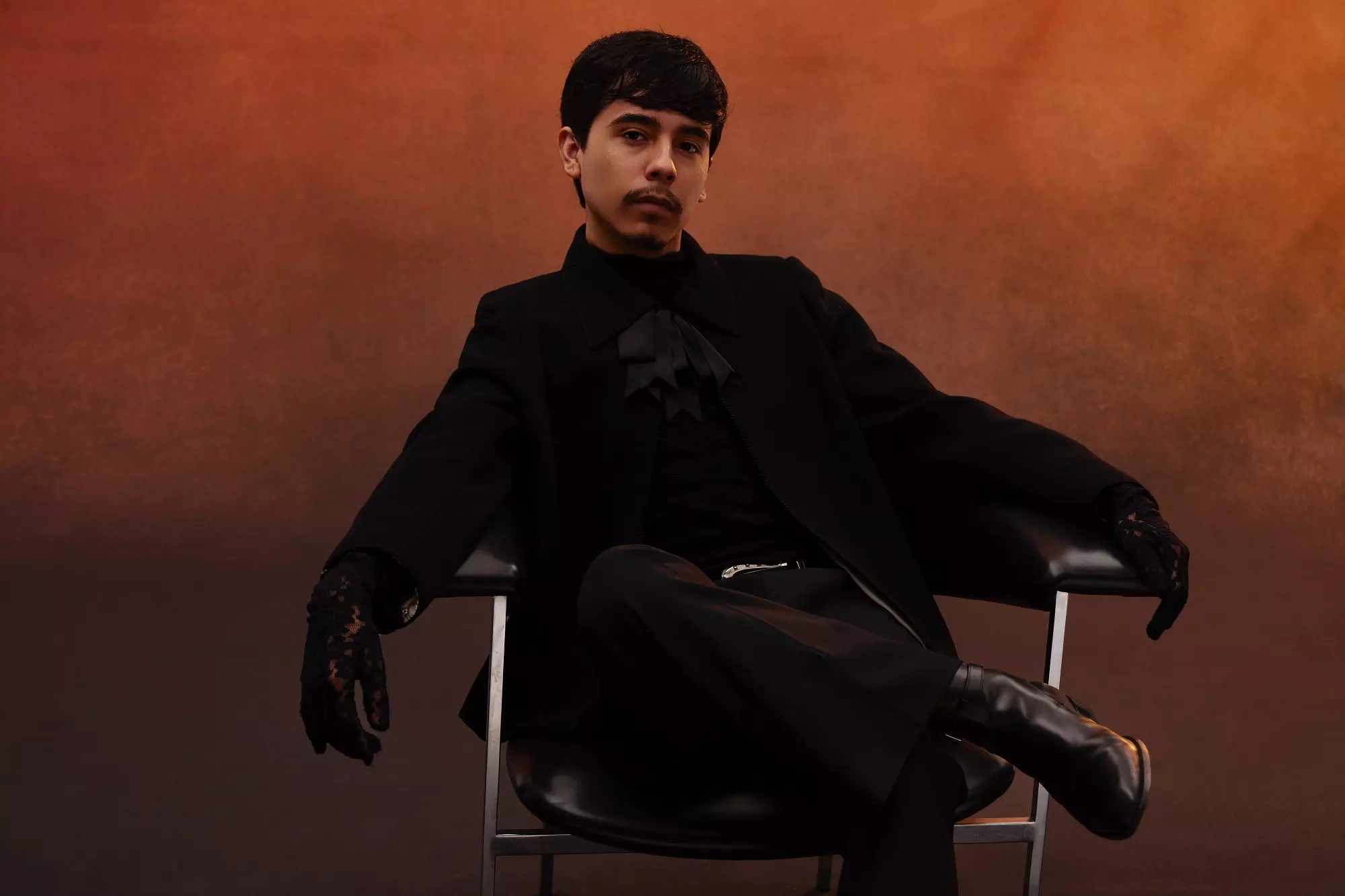
On 'Mirada,' Ivan Cornejo Redefines The Sound Of Sad Sierreño And Helps Fans Heal Through Music
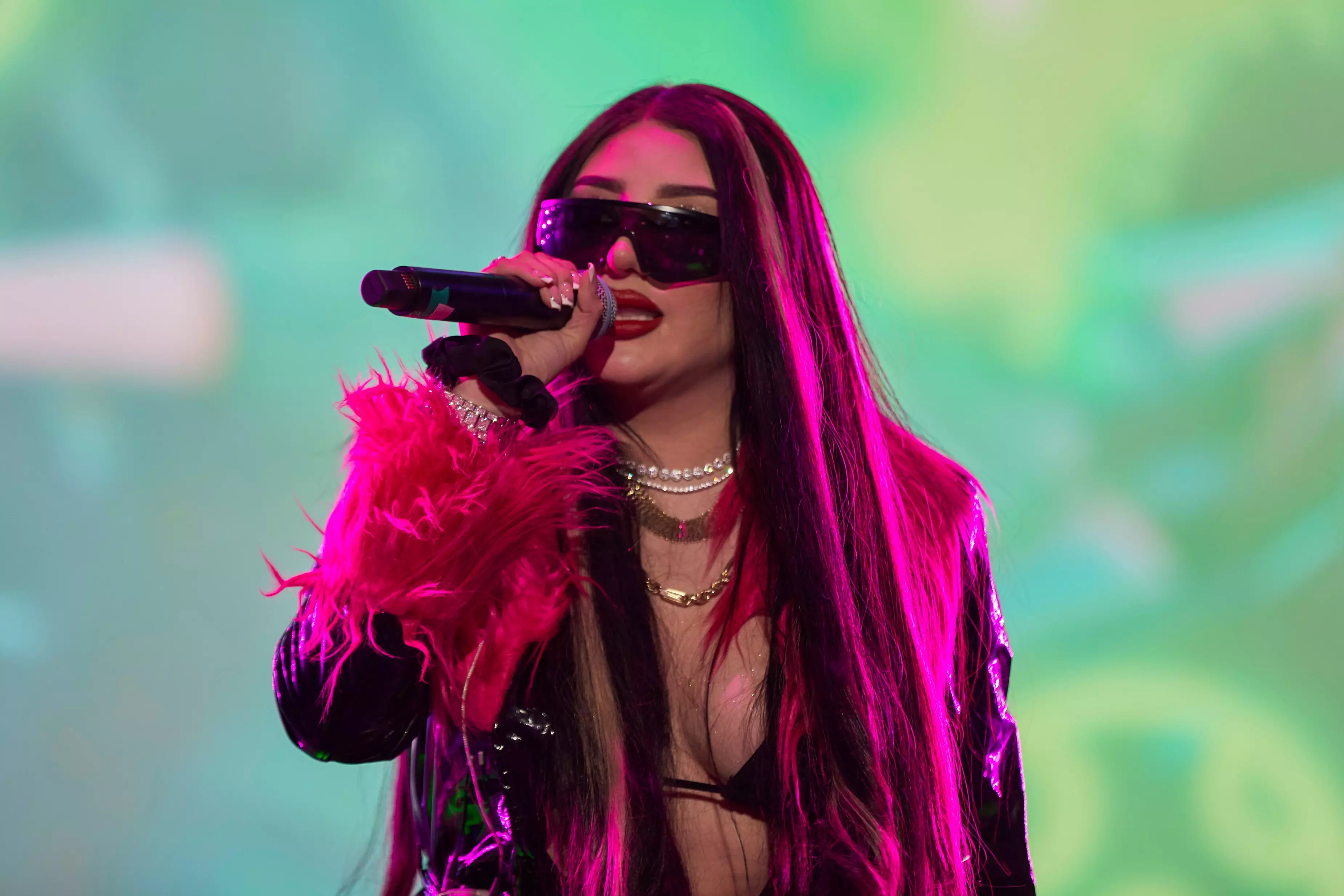
7 Artists Bringing Reggaeton Mexa To The World: El Malilla, Bellakath & More
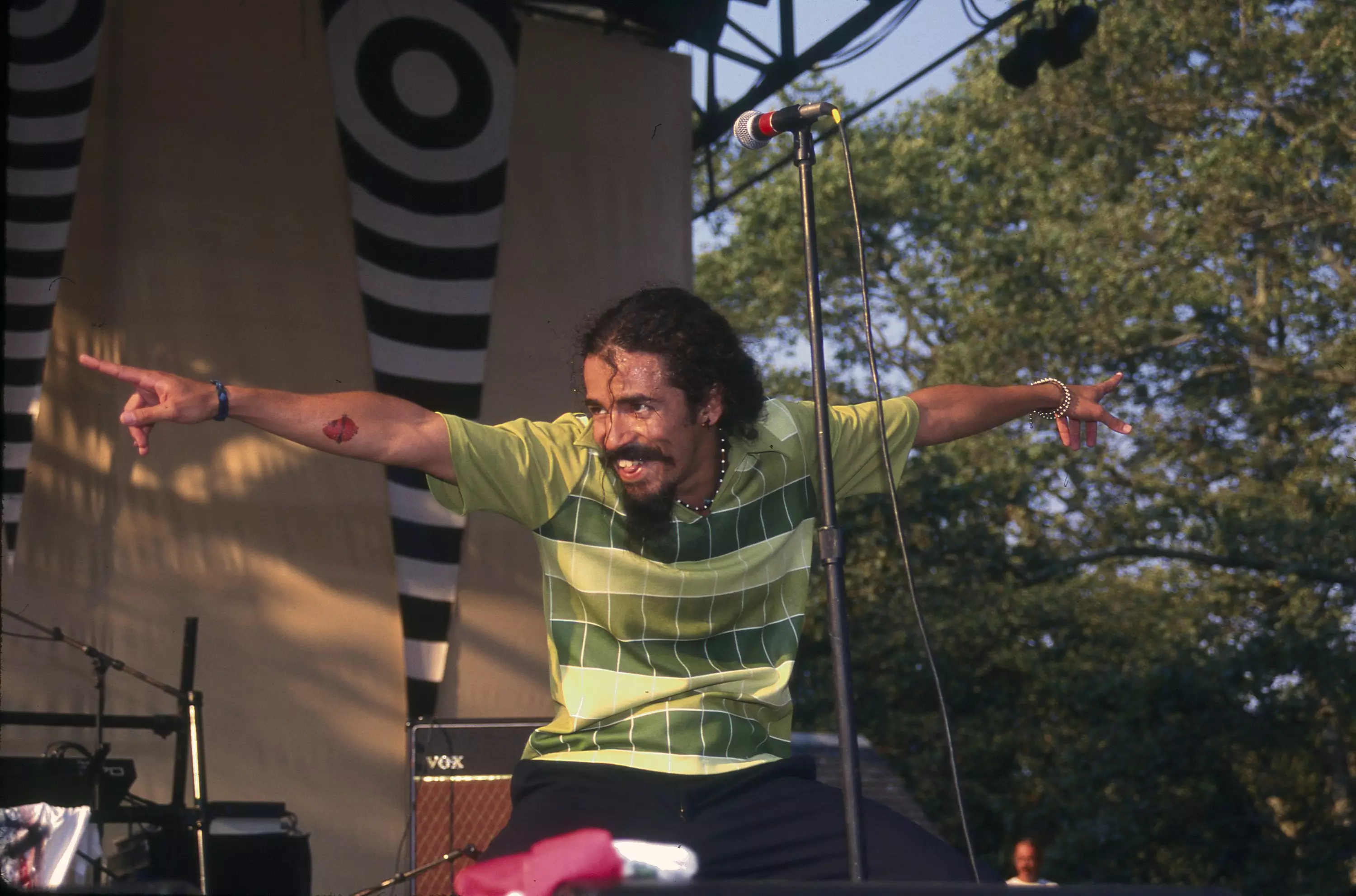
Revisiting 'Re': How Café Tacvba’s 1994 Masterpiece Changed Mexican Music Forever
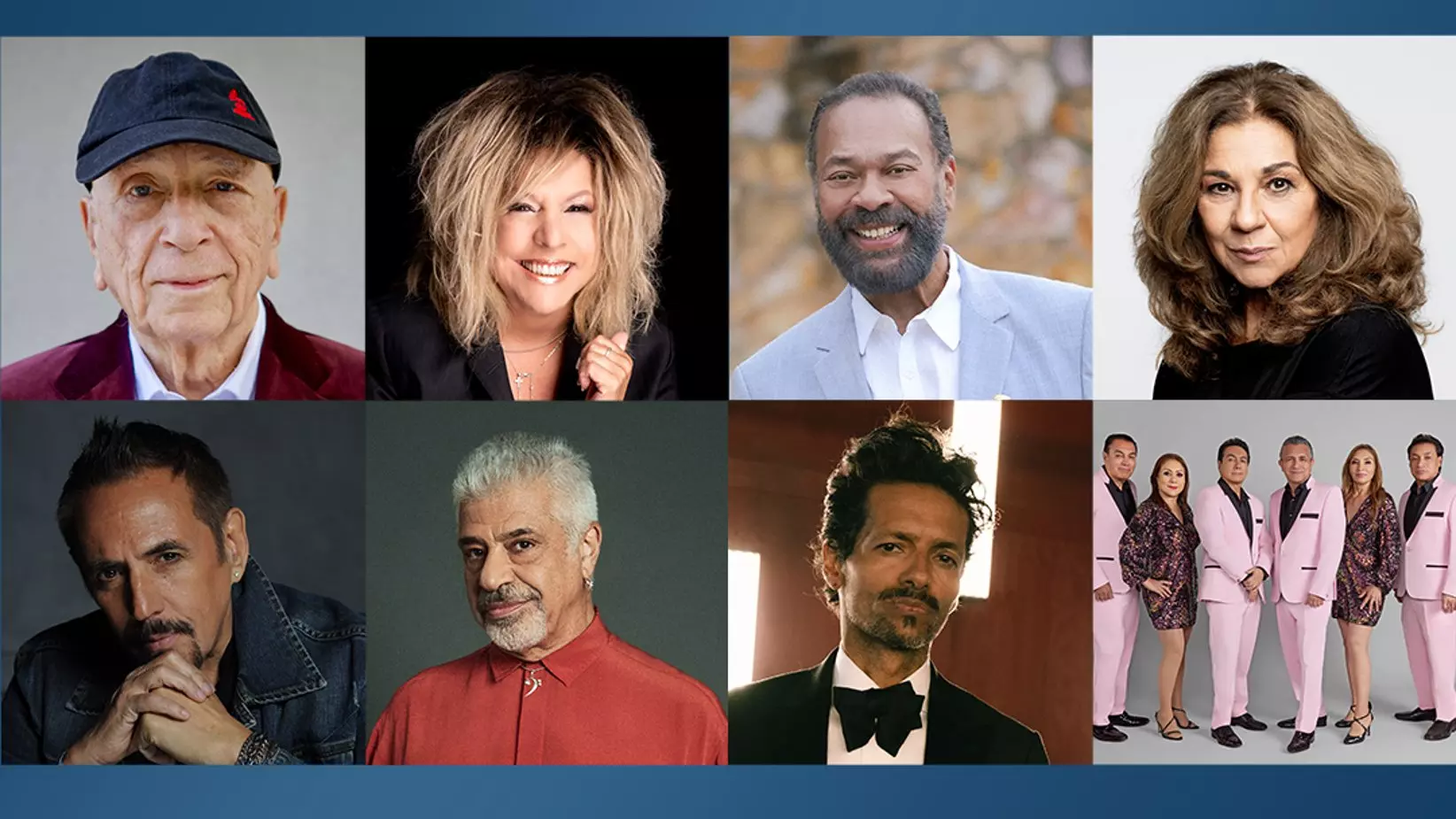
The Latin Recording Academy Announces 2024 Special Awards Recipients: Los Ángeles Azules, Draco Rosa, Albita, Lolita Flores & More

Nelly Furtado On How Remix Culture, ADHD & Gen Z Inspired Her New Album '7'
.jpg)
Photo: Josue Rivas
news
On 'Notebook Fantasy,' Chicano Batman Open Up Their Psychedelic Soul: "We Always Know We're Going To Have That 'It' Factor"
When Los Angeles favorites Chicano Batman got together with star producer John Congleton, he coaxed out their deepest and most dynamic aural feast yet. Read an interview with their guitarist, Carlos Arévalo.
Sometimes, when bands come to work with big producers, industry pressures kick in, and they start to sound less like themselves. Hearteningly, when Chicano Batman hooked up with John Congleton — who's worked with everyone from St. Vincent to Brian Wilson to Alvvays — the opposite happened.
"At the core of it, we still do what we've always done from the beginning," their guitarist, Carlos Arévalo, tells GRAMMY.com. "Which is: we get in a room, we get in a circle, look at each other and start recording the songs together, which is like jazz."
Indeed, Arévalo comes from a rich jazz background — and that helps explain the sumptuous sound of their new album, Notebook Fantasy, due out March 29. When you hear highlights like "Fly," "Hojas Secas" and "Fairytale Love," you'll grasp exactly what he means.
"It's amazing what happens when you put really good musicians in a room. You give them some direction and you say, 'Go.' Magic happens," he says, characterizing Chicano Batman as "old school" in how they approach their craft.
"We always know we're going to have that 'it' factor, and the magic is going to be in the room if we're in a room playing together," Arévalo continues. "That's what we've always done, and we continue to do on this record."
Read on for a full interview with Arévalo about how Notebook Fantasy came to be.
This interview has been edited for clarity.
The textures on Notebook Fantasy really spoke to me. Can you take me through Chicano Batman's textural thinking on this record?
When we met with [John Congleton] him to talk about the album, he was like, "I've listened to your past records, I love them. I feel like the sounds you're going for on those records are great, the songs are great, but I want the songs to come through more clearly on this record.
"Let's not use a lot of distortion and compression to color your sound. Let's go for something more open-sounding, more dynamic." Which is very in line with record making pre-2000 — like, '90s, '80s, '70s.
And so that meant going to a proper studio — Sunset Sound Recorders in Hollywood — and using those classic recording desks, those mixing consoles, the API, the Neves — those things that are just so high quality that when you record into them, they're picking up every bit of musical clarity from your amplifier, your voice, the bass.
When you hear it on playback, it's just so beautifully colored without having to add all these extra things to make it sound good. Which was our process in the past because we didn't have access to things like that. We were using DIY equipment, and sometimes that means you have to use a bunch of things to make it sound the way you want it to sound.
But when you work with equipment like what they have at Sunset Sound, it's like, less is more. You get what you pay for: you have a great sounding room, a great sounding mixing desk, all you're going to have to do is play well and it's going to pick up that.
And so yes, the record has these beautiful textures that are just open, transparent, and big-sounding. A lot of it comes down to obviously the players, but using those classic pieces of gear that were used on the Doors' records, Prince records, Led Zeppelin records, Rolling Stones records... literally the same piece of equipment.
Did any albums from the canon come to mind as you crafted Notebook Fantasy?
Definitely. Steely Dan has always been a big, quirky inspiration for me. I unapologetically, actually like Steely Dan, and I appreciate their records, because they bridged that gap that I sought after for many years.
[That aesthetic] had been there for decades before I knew about it, but I was always like, "Man, where's the rock band using this jazz virtuosity or these complex harmonic chord progressions, mixing it with rock's danger?"
And I found out about Steely Dan through a good friend of mine when I was 18. He put me onto them and I was like, "This is kind of smooth, but it's kind of subversive." And then eventually after multiple listens, I was like, this is amazing. These guys are incredible.
And so anyways, that was definitely a point of reference in terms of sonics, just the clarity of those records. Those are the most famous recordings in terms of production. You put them on your turntable, you turn the volume up, and it feels like you're in the room with the musicians. So, that was definitely something to try to attain as best as we could.
Give me a song on the album that reflects that Dan dyad.
Probably "Fly," which is the lead single. That one has Prophet synthesizers and Junos. I mean, they didn't use those kinds of things, but it has a Rhodes as well.
Actually, you know what? Maybe not "Fly." It would probably be "Live Today."The song was one of the last songs to make the record. We were running out of time and we were trying to figure out what song to record last.
I showed that song to the group, and Congleton loved it immediately, because he understood that it was something that could compliment the rest of the material. It was a compositional texture we hadn't used yet on the record. And so I had the parts already written out, but I wanted to see what would happen if I was just like, "Here you go. Let's start tracking."
We worked on that song with this keyboardist named Quincy McCreary, who plays with Jack White and Unknown Mortal Orchestra. He was in town for a gig at the Forum with Jack White, but he had the morning off.He did his thing on the Fender Roads. And then we had this amazing drummer, Tamir Barzilay, who plays with Jason Mraz, and he's played with Macy Gray. Incredible instincts and just musicality on the drums.
It was honestly like a Steely Dan moment. We were directing the song, we're like the inferior musicians, but the songwriters, but we have these amazing musicians there to blossom the tunes.
That's what happened on a song like "Live Today." It was just fast because we worked fast because it's tracking live, and it was immediately gratifying. And I remember Congleton playing back the song, he was like, "This is great. I love this song."
And that was really cool to hear because Congleton kind of has a poker face and he's no bullshit, and he's very direct and objective, which is what you want in a producer. And I remember he did show emotion right there, and he was like, "This is awesome." And so that was fun.
How does Notebook Fantasy reflect your evolution as a guitarist and keyboardist?
Every time I record a new album with Chicano Batman, I try to approach it differently, and build upon what I had recorded in the past. But in doing so, I try to do something different — take myself out of my comfort zone.
In the past, I would write my guitar solos because I want them to be memorable, melodic, singable. And on this record, I didn't do that. I used the instincts of John [Congleton] and our bassist, Eduardo, to help guide me into getting the best takes in certain songs.
So a song like "Live Today," the guitar solo, that was improvised. That was the first take. And I remember I recorded it and I thought, "I don't know, that was probably terrible." And John and Eduardo were like, "That was amazing. Let's move on." And then when you have trust like that with people, it's easy. Cause then you don't have to doubt yourself, you just listen to them and move forward.
Same thing with the end of the song, we have a song called "Parallels." It's like an improvisatory guitar outro. That was done on the third take. I did one pass improvise, and it was more typical of what would be my comfort zone as a musician.
And then, I got some feedback from John and Eduardo, like: "No, try to play here on these spaces." And I did. And again, like I said, the proof was when Congleton jumped up and was just like, "Yes!" He just evoked a sound of approval. I must be doing something right right now, even though I don't understand it.
Because you can't be objective. You're just purely trying to be emotional as a musician and do something that hopefully is felt by the listener. And he was there to be like, "That was the take. Don't overthink it. Let's move on." And listening back, he was right. I really am very proud of those guitar parts.
Give me some MVP moments from your bandmates on Notebook Fantasy.
Eduardo's bass playing on "Fly" is just incredible. It's so funky. It's so pocket, and it's so melodic. It's everything. I just can't stop listening to that take.
And from Bardo... Man, Bardo did so amazing on all the tracks. I mean, on the title track, "Notebook Fantasy," he's reaching and hitting notes that I didn't know he had in him, and he crushed it absolutely on the entire record.
Those guys just continually pleasantly surprise me. Every time we get into the studio, it's just like, Yes, this is why I work with these people. Because they're so talented and they're able to reach inside of themselves and pull something out that's new.
And what's your MVP moment? Pressure's on now!
Probably the song "Hojas Secas."
That's one of the songs Eduardo wrote, and he had a very clear vision for what he wanted the guitars to do on that, the lead guitars. And he wanted a column response, but he didn't want bluesy Page licks, or Hendrix licks. He wanted something that was more brash and harsh, but still had an element of beauty.
And his guidance and Congleton's guidance on that just really helped me get out parts that I didn't know I had in me at all. I didn't know I could play like that. I probably knew I could play like that, but I didn't know I would ever get to use those techniques within this band.
It was just a moment where I was like, Man, we could do anything in this band. As long as we're being true to ourselves as musicians and trying to grow, there is no limit to this.
Chicano Batman Talk Creating Visibility For Invisible People, Representation Of Latinos In Media & Repping Los Angeles

Eme Alfonso performs at the International Jazz Plaza Festival in 2018
Photo: Erika Goldring/Getty Images
news
GRAMMY.com To Launch New Digital Performance Series "Global Spin" To Celebrate Global Music
Launching Tuesday, Sept. 28, "Global Spin" will celebrate exciting genres like Afrobeats, K-Pop and Latin music and will include exclusive performances from Eme Alfonso, Candy Bleakz, and many others
Last year, the GRAMMY Awards updated the Best World Music Album category to Best Global Music Album to honor artists across the globe. But why stop there?
On Tuesday, Sept. 28, GRAMMY.com will premiere its latest digital series: Global Spin, a performance series spotlighting artists from around the world. Each episode of Global Spin will feature a performance from a notable artist or group and will celebrate both the creators and their home countries.
Airing biweekly on Tuesdays at 10 a.m. PT/1 p.m ET on the Recording Academy's official YouTube channel, Facebook page, Instagram page, and Twitter profile, Global Spin is the new home for global music on GRAMMY.com, where the celebration of the genre and the international artist community is the focus. With electrifying artists like Cuban singer/songwriter Eme Alfonso and Nigerian rapper Candy Bleakz confirmed for performances, Global Spin will keep fans of the international music community plugged into one of the most exciting lanes in all of music.
"Music is one thing that transcends borders," Alina Vission, a Content Producer at the Recording Academy and the creator and co-producer of Global Spin, tells GRAMMY.com. "We're excited to celebrate the global music community and take our audience on a trip around the world through music."
"I am extremely excited to have the opportunity to help showcase global music and to shine a light on all the talented musicians across the world," Hillary Melin, Senior Editor/Producer at the Recording Academy and one of the co-producers of the series, says of Global Spin.
Read: Olamidé On The Ascent Of Afrobeats, Supporting Newer Artists & His Subdued New Album UY Scuti
A platform to support international artists, Global Spin is born out of the exploding global music scene taking the world by storm today. Whether it be Nigeria's dynamic duo of Wizkid and Tems sweeping the world off their feet with their chart-topping track "Essence" or South Korea's BTS serenading their way into the millions of hearts of the BTS ARMY, global music and artists are dominating today's worldwide music industry like never before.
Shawn Thwaites, a Project Manager in the Recording Academy's Awards department and genre manager for Global Music, partly credits the international growth of global music to the new and rising wave of Afrobeats artists. Still, he notes Afrobeats and global music at large are nothing new; pioneers like Fela Kuti and boundary-pushers like Brazil's Djavan laid the foundation for today's scene decades ago. "It's always been here—we're just catching on," Thwaites says of the global music sound.
As Afrobeats and Afropop continue to rise in the global music sphere, Thwaites also points to "the whole continent of Africa" as well as regions like Brazil, Trinidad, Barbados, Latin America, Asia, and beyond as locations with thriving music scenes to watch. "There's so much music all over this world. Global music is truly global," he reflects.
Read: Altin Gün On 'Yol' & The Future Of Global Music: "We Like To Think We Defy Genres As A Band"
With the ongoing evolution and proliferation of music technology and social media, global music continues to reach new audiences across international borders, while the genre's established artists and rising stars are pushing the sound's boundaries to new heights.
"I would love for global music to find a way to connect more with the fans," Dominican singer/songwriter and producer the Change tells GRAMMY.com via email. "Within the next five to 10 years, I would love to see more activities that help us spend time with our fans, because in the end, we owe them everything that is happening to us."
"The growing interest in global music means a lot more people from different walks of life and different parts of the world will now be able to relate to my genre of music: Afrobeats," Ghanaian Afropop, dancehall and R&B singer/artist MzVee adds. "I believe music is a global language that transcends all boundaries, and I want to reach fans in every corner of the world, despite the differences in language and genres. My dream is to see global music reach every corner of the world, for global music to break all barriers, to see my music being consumed by everybody, [regardless of] the differences in language, culture [and] religion."
"I'm very happy that [audiences] want to explore and open new doors. I believe that when we learn from other cultures, we grow as human beings," Eme Alfonso tells GRAMMY.com by email. "I would like the people to understand that when they are listening to music from other parts of the world, they are feeling the history, the reality, and the conflicts of a country, because artists reflect their life and problems through art."
But perhaps Haitian DJ/producer Michael Brun said it best: "Global music is the future of music," he bluntly told GRAMMY.com in 2020. "As the world continues to become more interconnected, music culture no longer has borders. The fusion of sounds breeds innovation, and global music artists are at the forefront of that movement."
That innovative movement now has a new home on GRAMMY.com with Global Spin.
Tune in to the sounds of the world with Global Spin every other Tuesday starting Sept. 28, at 10 a.m. PT/1 p.m ET on the Recording Academy's official YouTube channel, Facebook page, Instagram page, and Twitter profile.
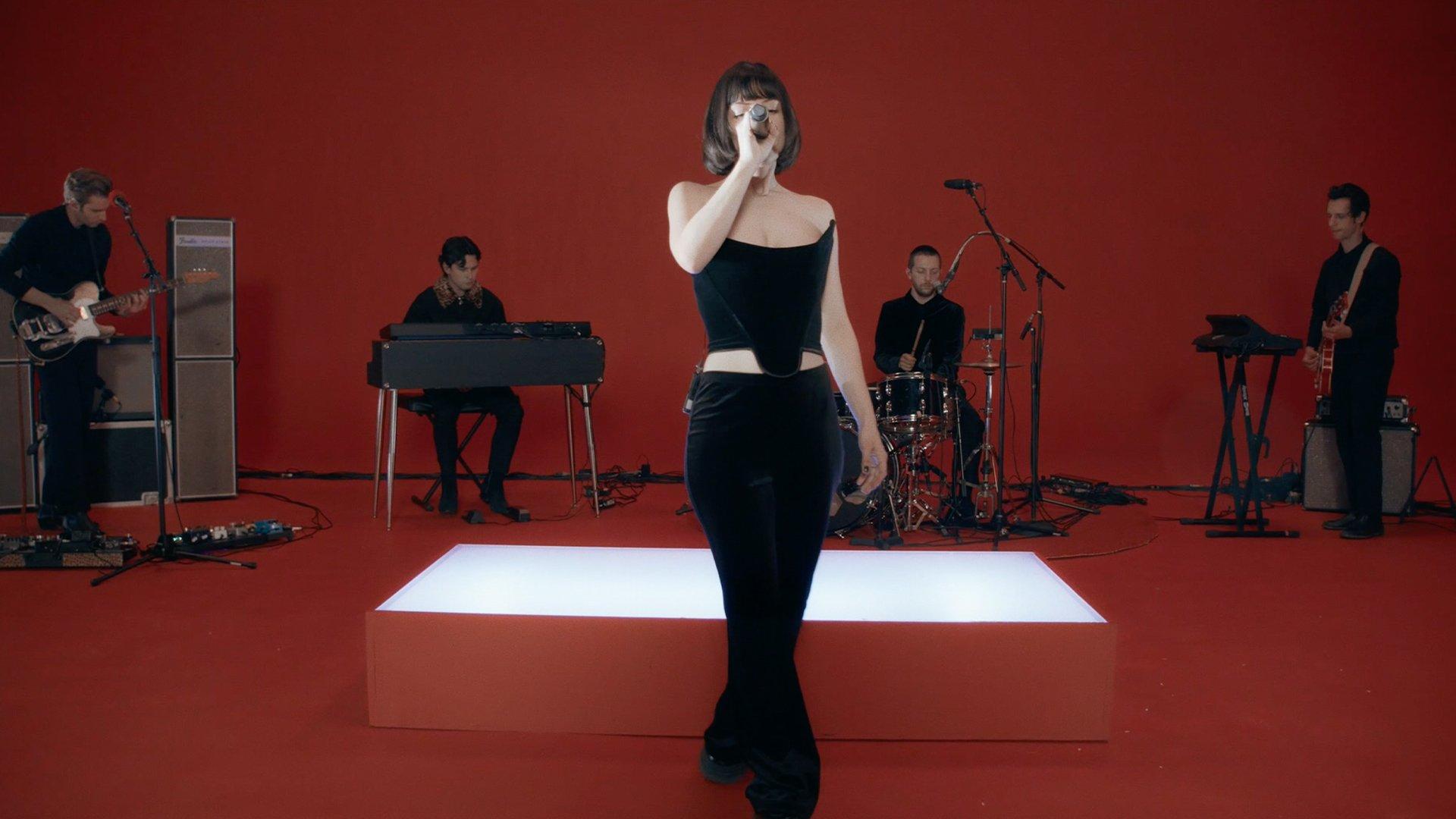
The Marías
news
Press Play At Home: Watch The Marías Deliver A Soothing Performance Of "Un Millón"
On the latest episode of the Press Play At Home performance series, watch alternative-pop band the Marías perfectly capture the warm feeling of love in their performance of "Un Millón"
True love can feel hypnotic. On the latest episode of the Press Play At Home performance series, alternative-pop band The Marías perfectly capture the mesmeric feeling of love with their warm performance of "Un Millón."
Serving as a love letter to lead singer María Zardoya's birthplace, Puerto Rico, "Un Millón" allows her to sweep the listener off their feet by pairing her commanding yet calm stage presence with her soothing delivery of the song's passionate lyrics.
As masterful as the song may sound, "Un Millón" almost didn't make it onto the Marías' recently released debut album, CINEMA, and serves as the alternative-pop band's introduction into reggaeton-inspired music.
"This is the first reggaeton-inspired track that we created," María tells GRAMMY.com. "I grew up listening to reggaeton, and we were curious to see what it would sound like if we tried making a reggaeton track."
Check out the Marías' powerful performance of "Un Millón" above and explore more episodes of Press Play At Home below.
